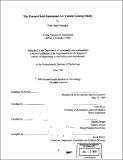The parent-child unmanned air vehicle concept study
Author(s)
Nochahrli, Tarek Sami, 1976-
DownloadFull printable version (32.01Mb)
Alternative title
Parent child unmanned air vehicle concept study
PCUAV concept study
Other Contributors
Massachusetts Institute of Technology. Dept. of Aeronautics and Astronautics.
Advisor
John Deyst.
Terms of use
Metadata
Show full item recordAbstract
The Parent Child Unmanned Aerial Vehicle (PCUAV) concept was developed within the context of the MIT Draper Technology Development Partnership Project. A desire at Draper Laboratory to build a fixed wing surveillance airplane to enhance the capabilities of its unmanned vehicle fleet initiated the project. The development objectives included the design of a first-of-a-kind system to be completed in two years (having started in June 1998), and the stimulation of the entrepreneurial spirit of involved engineering students at MIT. A conceptual design derived after eleven months of research includes a system of vehicles where the parent vehicle (acting as a transport vehicle) has the capability of carrying mini and micro unmanned vehicles, deploying them at a mission site, and relaying the collected data by those vehicles back to the ground station. This thesis describes the stages followed during the design process and shows the results of several studies that can be used for the selection of an appropriate demonstration concept.
Description
Thesis (M.Eng.)--Massachusetts Institute of Technology, Dept. of Aeronautics and Astronautics, 1999. Includes bibliographical references (p. 92).
Date issued
1999Department
Massachusetts Institute of Technology. Department of Aeronautics and AstronauticsPublisher
Massachusetts Institute of Technology
Keywords
Aeronautics and Astronautics.